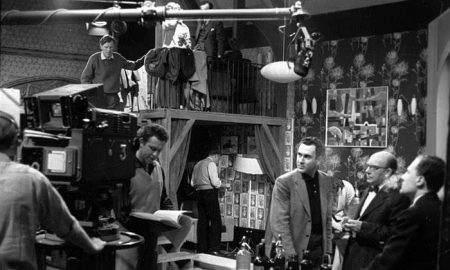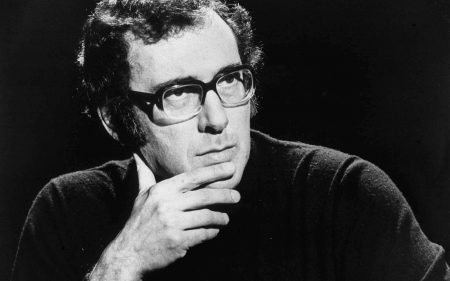Harold Pinter died ten years ago, and the anniversary is being recognised this summer by a season of screenings of his TV and film work at the British Film Institute’s BFI South Bank cinemas in London. As most people know, Pinter’s output spanned theatre, film, television and radio drama, poetry, prose and political essays. He came to prominence in the 1960s, and he is often cited as one of the most significant British writers of the post-war period. His plays include classics such as The Caretaker (1959), No Man’s Land (1975) and One for the Road (1984) and he scripted films such as The Go-Between (1970) and The French Lieutenant’s Woman (1981). He won a Nobel Prize for Literature in 2005, and his career involved significant collaborations with renowned actors and directors including Dirk Bogarde, Judi Dench, Michael Gambon, John Gielgud, Peter Hall, Jeremy Irons, Joseph Losey, Ralph Richardson, Ian Rickson and Meryl Streep.
In the late 1950s Pinter was pursuing a moderately successful career as an actor, and it was while he was performing in a touring production of the comedy Doctor in the House that he wrote his first full-length play, The Birthday Party. However, the play’s London reviews were very poor and it took several years and more plays for Pinter to achieve a reputation in mainstream theatre. On the other hand, BBC had already commissioned Pinter’s first broadcast play A Slight Ache (1959) for its highbrow Third Programme radio service and ITV television was in the vanguard of establishing the canonical status that Pinter would go on to have. Although we might think of Pinter primarily as a theatre writer, broadcasting was crucial to his career.
Val Gielgud, brother of the actor John Gielgud, was Head of Drama at the BBC from 1934 to 1963. He believed that broadcasting should present the classics every few years, and he had no interest in contemporary “Absurd” drama like Pinter’s or Samuel Beckett’s. On the other hand, Associated-Rediffusion, the commercial ITV company that broadcast to the London TV region and contributed to the ITV network was keen to demonstrate its cultural credentials by making prestige drama. As Michael Billington’s excellent biography of Pinter tells, A-R’s producer Peter Willes read The Birthday Party and invited Pinter to meet him, greeting him with the words: “How dare you?” When Pinter looked puzzled by this remark, Willes explained: “I’’ve read your bloody play and I haven’t had a wink of sleep for four nights.” The highly skilled director Joan Kemp-Welch made a great success of the play, which was broadcast on national ITV on 22 March 1960 in the regular series Play of the Week. Far more people got to hear about Pinter on ITV television and BBC radio than saw his work at the theatre.
The rest is history. Until 1965 it was on the commercial ITV channel, rather than BBC TV, that Pinter’s theatre plays were shown, with broadcasts of A Night Out (ABC, 1960), The Room (Granada, 1961), The Collection (A-R, 1961), The Dumb Waiter (Granada, 1961) and The Lover (A-R, 1963). Later, BBC also broadcast TV Pinter, including some productions in which he acted in his own work such as a celebrated version of The Birthday Party in 1987 when Pinter played the sinister Mr Goldberg. He wrote original drama for television as well as adapting his own theatre plays, and also featured on BBC arts programmes like Late Night Line-Up and Arena, talking about his own work and commenting on current culture and politics. He became a well-known media figure, and often a controversial one.
I am collaborating on ‘Pinter Histories & Legacies’, an Arts and Humanities Research Council project that runs from 2017-19, and which documents every professional production of Pinter’s plays in the UK, as well as his output on television, radio and film. This will create a public database as well as the expected kinds of academic output like conferences and publications, and the BFI screening season this summer that our research team collaborates on. The season will also coincide with the launch of a new BFI boxed set of Pinter’s work on DVD. Further details of the two-month screening season and DVD will be announced this month, after a brief Pinteresque pause while BFI finalises the release dates.
Jonathan Bignell is Professor of Television and Film at the University of Reading. He works on histories of television drama, cinema and children’s media, and on the AHRC research project ‘Pinter Histories & Legacies’ which is a collaboration with colleagues at Reading, Leeds and Birmingham universities. Some of his work is available free online from his university web page or from his academia.edu page.







